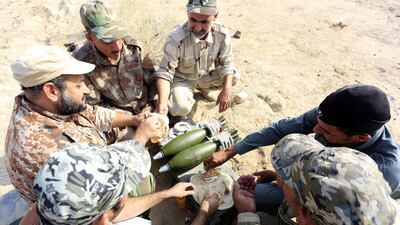Iraq's militias are struggling to get a grip on political power after affiliated nominees for key cabinet positions were rejected by parliament.
Prime Minister Adel Abdul Mahdi's nominee for interior minister was Falih Al Fayadh, the former chairman of the Hashed Al Shaabi paramilitaries, also known as the Popular Mobilisation Units (PMUs), while Asma Al Kildani, whose brother Rayan Kildani is the head of the Christian "Babylon Brigade", was nominated to head the justice ministry.
They were among the eight of Mr Abdul Mahdi's 22 cabinet picks who were rejected by parliament in a vote late on Wednesday, underscoring the discord plaguing Iraqi politics.
Parliament will vote on fresh candidates for the key posts of defence, justice and interior next week.
Mr Abdul Mahdi, who was elected by parliament last month, is widely seen as a capable technocrat with no affiliation to any party and a reputation for secularism. Yet, if all of his ministerial nominations were passed then Iraq would have seen an expansion of militia presence in government.
The militias were formed in 2014 after Iraq's top Shiite cleric, Ayatollah Ali Al Sistani, urged citizens to take up arms against ISIS militants who had swept aside government forces and seized control of much of northern Iraq. Many of the militias are under Iranian influence after being trained and financed by Iran.
An electoral bloc formed by militia leader Hadi Al Amiri came second in May's parliamentary elections, yet their participation in politics remains controversial as their leaders are seen as proxies of Iran.
"The Hashed has always had political power, Hadi Al Amiri has been one of the main political actors guiding the government formation. So, they are very much part of the political process, said Renad Mansour, senior research fellow at Chatham House.
The main issue is how strong and capable the new prime minister and ministers will be in pursuing their goals, he said.
"The parliament seems to be fragmented: a lot of MPs are dissenting, there’s no party discipline. These new dynamics are going to attempt to spoil the backroom deals that the main political parties like to have."
The PMUs may be facing a struggle to get their hands on power, but Fatah has not given up, said Kirk Sowell, an Iraq expert with Utica Risk Services.
"They failed to get their main candidate, Falih Al Fayad, passed last night. In fact he was their fallback after they were pushing a member of their own party, Abd Al Karim Al Ansari. The other candidate close to the Hashed, Asma Al Kildani, for the justice ministry, also failed," Mr Sowell told The National.
But the next government must its strengthen security ministries to become less dependent on semi-autonomous armed groups, the International Crisis Group warned in a report.
"The Hashed are becoming a part of the challenge of rebuilding a state dismantled after the US-led invasion of 2003," the ICG report said.
The PMUs are part of the state’s security apparatus under Iraqi law, but they are also recognised as an autonomous unit under the civilian National Security Council. They are exploiting a legal grey zone to expand their reach in the security, political and economic spheres, the report said.
For the time being, leaders of the PMUs are trying to maintain control by influencing the appointment of ministers to the security ministries, said Harith Hassan, a non-resident senior fellow at the Carnegie Middle East Center.
"They are allying with the main Sunni factions, hoping to influence the future minister of defence, who will be appointed by Sunni groups," Mr Hassan told The National.
Since Mr Abdul Mahdi's does not have a political coalition backing him, his government is likely to be weak. His premiership was the result of an agreement between Mr Al Amiri's Fatah and the Sairoon bloc led by populist cleric Moqtada Al Sadr, whose relations are tense.
An MP from the Al Wataniya block led by outgoing vice president Ayad Allawi said the militias "manipulated the elections and have managed to penetrate the parliament because of their lack of the integrity”.
"Their dominance is sheer and has been manifested in the dictation of ministerial posts for key ministries," the member told The National.
The ICG report said the challenge the militias pose in Iraq will not be overcome easily, and they are likely to remain a significant military, political and economic actor in the country's post-ISIS phase.
_______________
Read more:
Iraq forms new government, five months after elections
Tens of thousands seek posts in Iraqi cabinet
Iraq PM designate Adel Abdul Mahdi met with cautious optimism
Iraq offers citizens opportunity to apply online for cabinet positions
_______________

